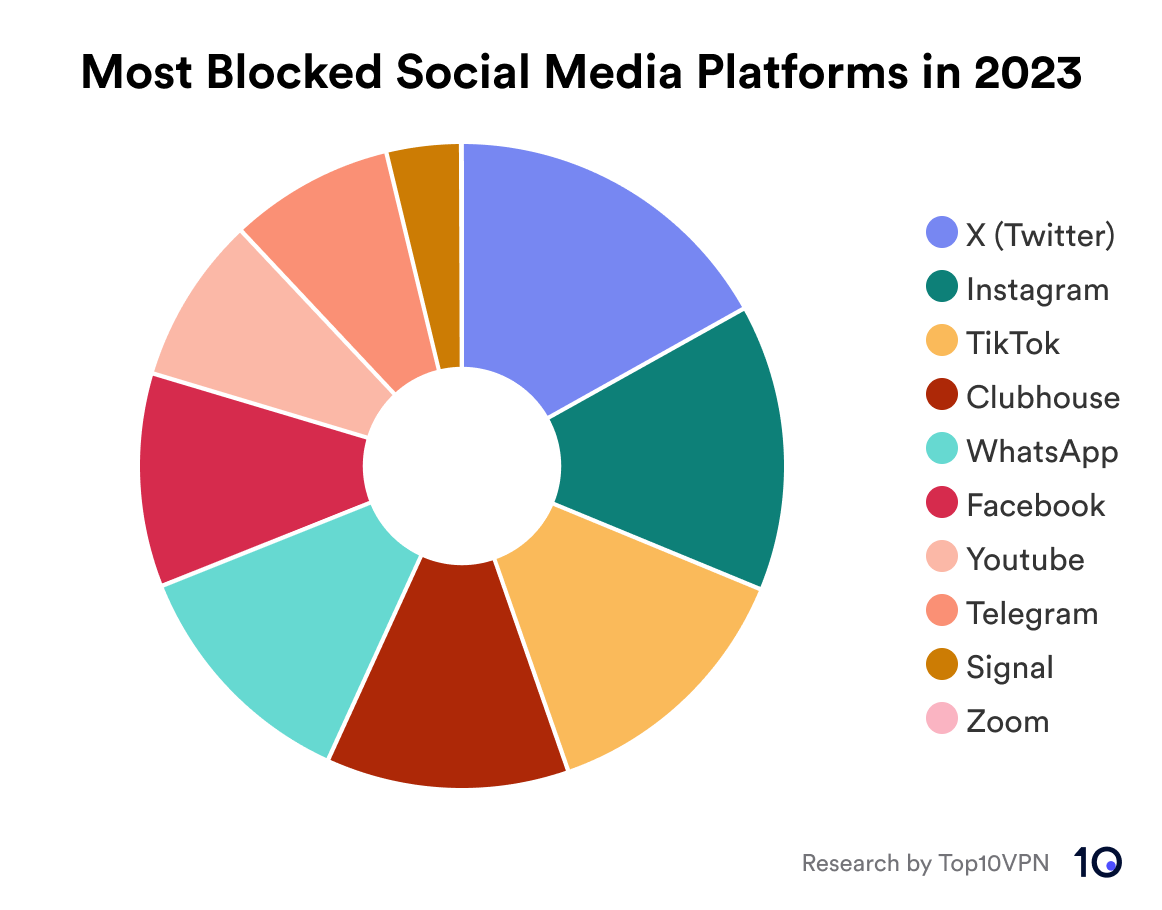Government Internet Shutdowns Cost Over $9 Billion in 2023
Our annual report analyzes every major intentional internet shutdown in 2023 and reveals that they cost the world economy $9.13 billion.
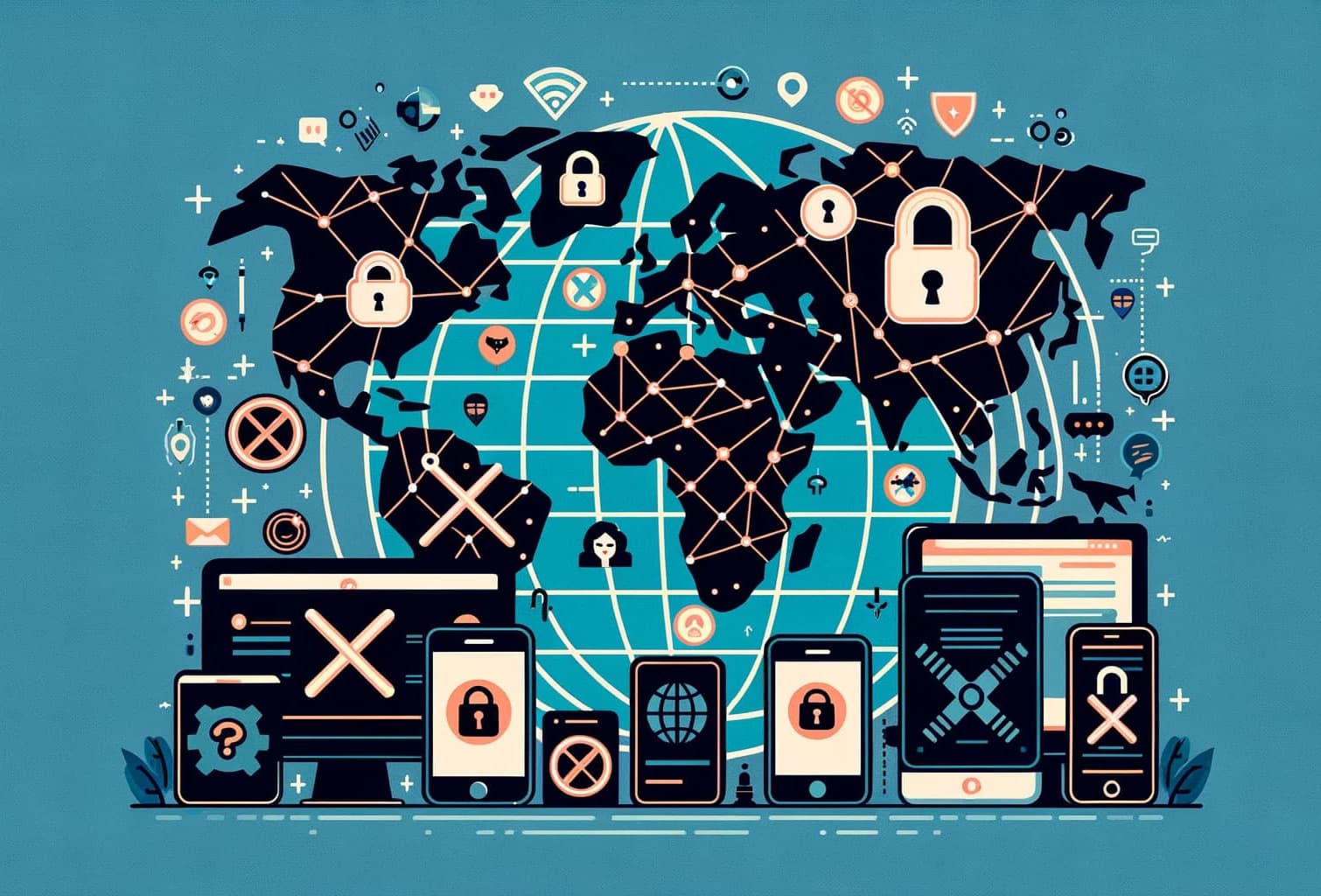
Read the key takeaways of our report into the cost of deliberate government internet outages around the world in 2023.
Internet Shutdowns: Economic Impact 2023
- $9.13 billion: economic cost of internet shutdowns in 2023
- 196 major self-imposed internet outages took place in 25 countries
- 79,238 hours of government internet disruptions
- Internet blackouts: 25,535 hours
- Social media blocks: 53,703 hours
- 747 million people affected by deliberate internet outages in 2023
- X (Twitter): the most blocked social media platform, suffering 10,683 hours of deliberate disruption – 18% more than Instagram and 26% more than TikTok
- Russia: the single most affected nation ($4.02 billion), followed by Ethiopia ($1.59 billion) and Myanmar ($974 million).
- Iraq: the nation with the largest number of internet shutdowns (66), almost all of which occurred in relation to school exams.
- Manipur, India: the longest shutdown imposed in 2023, totaling in over 5,000 hours.
- Human rights impact: 50% of government internet outages were associated with additional human rights abuses in 2023, most frequently restrictions on freedom of assembly.
What is the Cost of Internet Shutdowns Tracker?
This Global Cost of Internet Shutdowns report calculates the total economic impact of every major deliberate internet outage and social media shutdown around the world in 2023.
This kind of deliberate disruption is internet censorship in its most extreme form. Not only do these internet outages infringe on citizens’ digital rights but they are also acts of national economic self-harm.
Jump straight to the data table below for a country-by-country breakdown of the global cost of internet shutdowns in 2023.
Government internet outages in 25 countries lasting over 79,000 hours cost the global economy $9.13 billion in 2023.
How Do We Calculate The Cost of Internet Shutdowns?
We monitor every national and region-wide internet outage and social media shutdown imposed by governments around the world in order to determine the duration and extent of the restrictions. This allows us to best determine the economic impact of each internet outage using the COST tool.
This tool was developed by internet monitoring NGO Netblocks. It is based on indicators from the World Bank, ITU, Eurostat and US Census.
In our Cost of Internet Shutdowns reports, we include social media shutdowns, internet blackouts and severe ISP throttling in our calculations. These types of disruption to internet access are defined as follows:
- Internet blackouts: where internet access is completely cut off by the government. This extreme measure cannot be directly circumvented.
- Social media shutdowns: where access to popular social media, such as Facebook, WhatsApp or Twitter, has been blocked. These blocks can typically be circumvented by using a Virtual Private Network (VPN).
- Severe throttling: where speeds have been slowed to such an extent the internet is barely usable, such as downgrading mobile connections to 2G. This is an internet blackout in all but name.
Internet service providers (ISPs) rely on a range of technical measures to implement internet shutdowns, including IP blocking, DNS filtering and BGP manipulation. You can read more about these tactics on our main Cost of Internet Shutdowns live tracker.
This year’s report forced us to confront some difficult questions.
- How do we track social media blocks that appear to have become permanent?
- Should we broaden the scope of social media shutdowns to include increasingly restricted popular platforms like TikTok and Telegram?
- How do we approach major internet outages that aren’t imposed by governments on their own citizens?
Both Russia and Iran imposed major social media restrictions in 2022 that showed no sign of ending in 2023. At what point does this stop being an internet shutdown and simply become the new normal?
After careful consideration, we took the view that the economic cost of social media restrictions be included in our calculations for up to 365 days. After this point, we exclude them as the restrictions represent ongoing internet censorship and many of the economic consequences will likely have been overcome by people switching to other platforms.
In a year where TikTok was blocked for more hours than WhatsApp, it was inarguable that the platform ought to be included in our calculations. We also took the opportunity to include Telegram, Signal, Clubhouse and Zoom.
While these changes make our methodology more accurate, they do unfortunately make it difficult to reliably compare 2023 with prior years. At the very least, any year-over-year comparison must exclude the additional social media platforms, which results in the following:
Cost of internet shutdowns: down by 67% compared to 2022 but up by 45% on 2021. For reference, if you weren’t to exclude the additional social media platforms, the economic impact is down by 63% compared to 2022 but up 60% vs 2021.
Duration of internet shutdowns: up by 18% compared to 2022 and up by 71.5% on 2021. Again, if you don’t exclude the additional platforms, the duration is up by 58% from 2022 and 129% from 2021.
Governments disrupting their own citizens’ internet access is not the only cause of internet shutdowns. While they are not included in our economic impact calculations, we have for the first time catalogued and analyzed these incidents.
Cost of Internet Shutdowns 2019-2022
- 2022: 114 internet shutdowns in 23 countries lasting 50,095 hours cost $24.61 billion. Russia was the most affected nation with a cost of $21.59 billion.
- 2021: 50 internet shutdowns in 21 countries lasting 30,179 hours cost $5.45 billion. Myanmar inflicted the worst economic damage on itself via internet outages ($2.8 billion).
- 2020: 93 internet shutdowns in 21 countries lasting 27,165 hours cost $4.01 billion. India imposed the most costly internet outages overall ($2.8 billion).
- 2019: 134 internet shutdowns in 22 countries lasting 19,207 hours cost $8.07 billion. Iraq’s internet outages were most costly ($2.3 billion).
Why Do We Track The Cost of Internet Shutdowns?
We stand opposed to internet censorship and to governments withholding access to the internet as a form of social control.
Our goal in doing this research is to keep public attention focused on just how damaging internet shutdowns truly are. This damage is both direct, in terms of the economic and human cost, and indirect, in that it forces people to use unsafe VPNs to try to circumvent the restrictions imposed upon them.
If you think an internet shutdown is likely, it’s worth reading up on the best ways to stay online.
See our live tracker of surges in VPN demand around the world
Internet Shutdowns 2023: Cost by Country
The following data table shows all countries that have experienced a major internet shutdown in 2023. The table is ordered from greatest to least economic impact, measured in USD.
The data table also indicates the nature of any additional human rights abuses perpetrated during each internet shutdown. A cross indicates that the human right specified was violated during the period around the internet outage.
For data on individual internet shutdowns, see the Cost of Internet Shutdowns Tracker Data Sheet.
For more information on the circumstances of each country’s shutdowns, jump to the Internet Shutdowns Background 2023 section of this report.
Internet Shutdowns 2023: Cost by Region
The following data table shows the total economic cost of all major internet shutdowns in 2023 broken down by the global region where the disruptions occurred. The data table is ordered from greatest to least economic impact, measured in USD. Russia is included under Europe.
The bar chart below shows the economic impact of all major internet shutdowns in 2023 on each of the global regions where the disruptions occurred, broken down by context, i.e. the reason why the internet outage was implemented. Note that Russia is included under Europe.
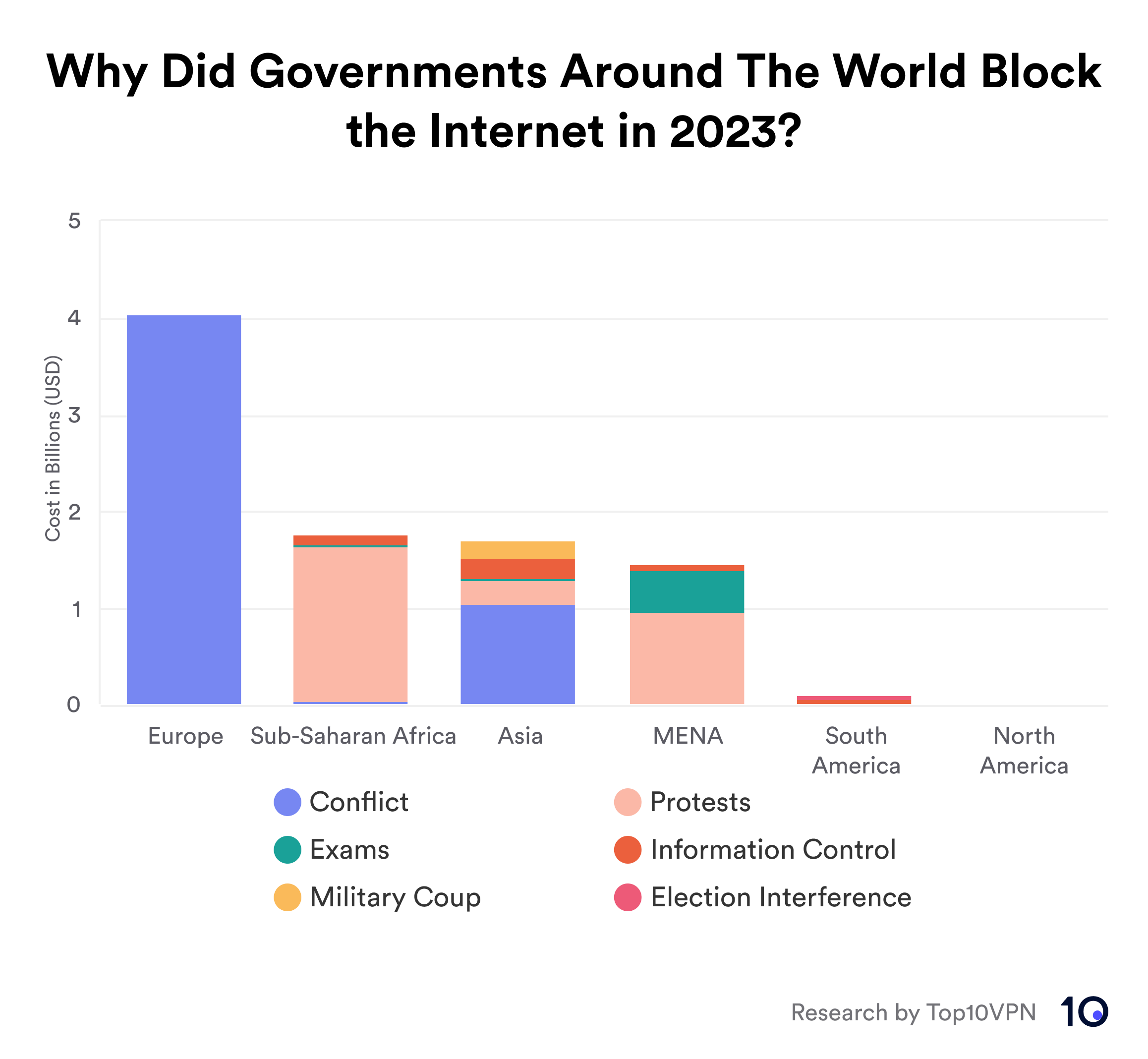
Bar chart showing the most expensive reasons for internet shutdowns in 2023 by global region.
Internet Shutdowns 2023: Cost by Context
The following data table shows the total economic cost of all major internet shutdowns in 2023 grouped by context, i.e. the nature of what prompted local authorities to cut internet access. The data table is ordered from greatest to least economic impact, measured in USD.
The data table also indicates the number of incidents in each category and the total duration of deliberate internet outages in hours.
The following chart shows split of the economic cost of all major government internet outages in 2023 by context, i.e. the nature of what prompted local authorities to cut internet access.
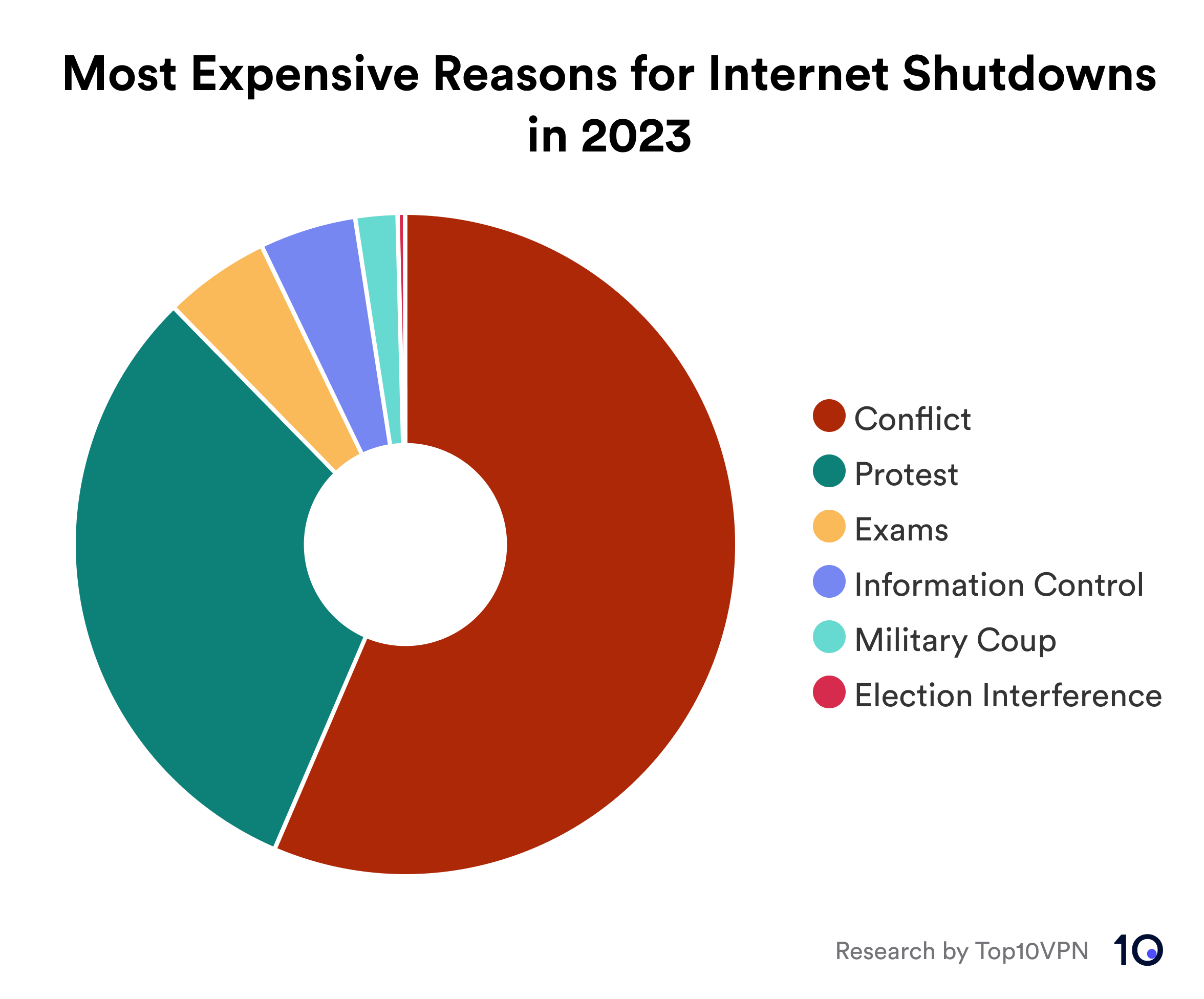
Donut chart showing the reasons for internet shutdowns in 2023 with the most economic impact
The following chart shows the split of reasons for all major government internet outages in 2023 by frequency.
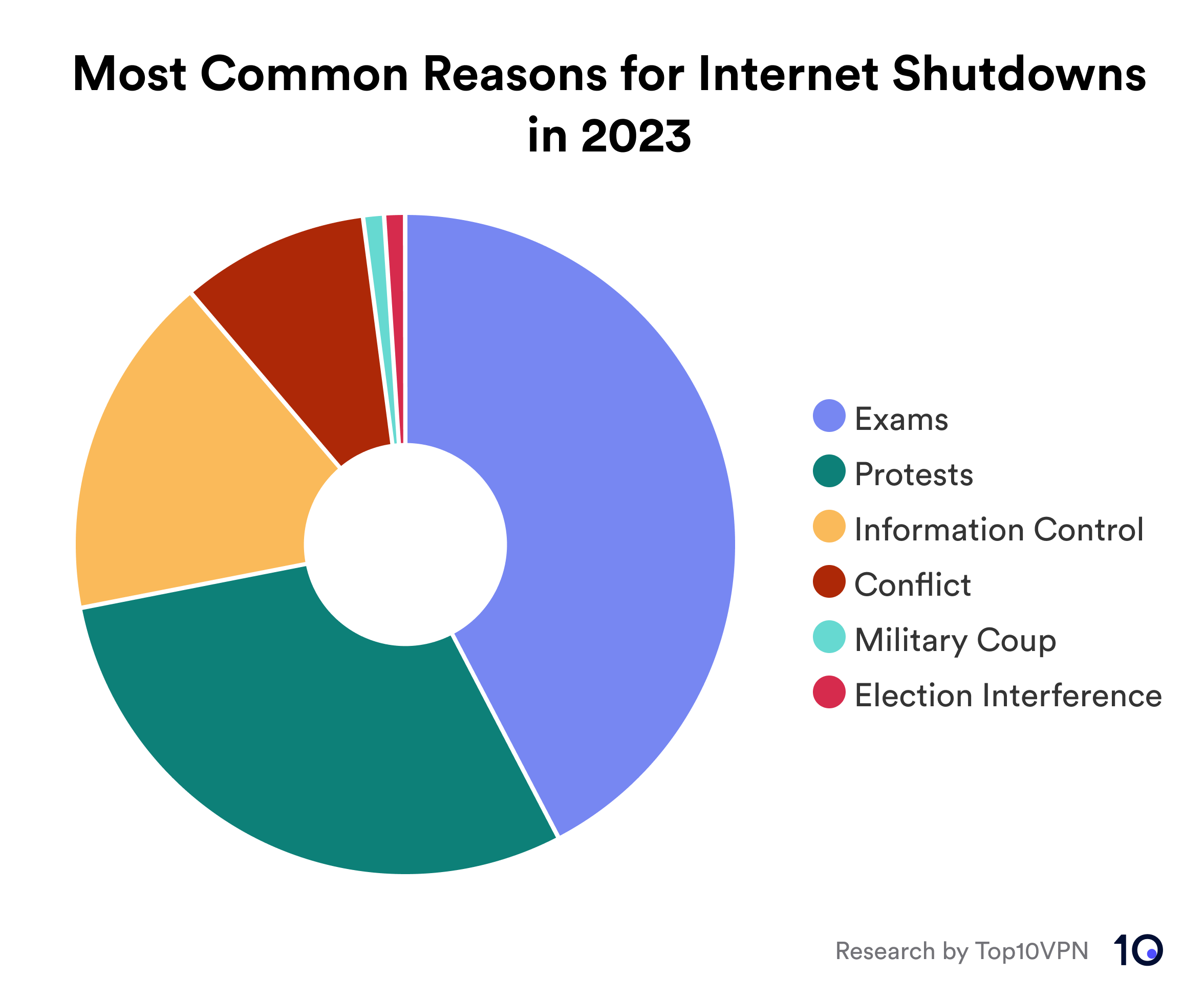
Donut chart showing the most common reasons for internet shutdowns in 2023
Internet Shutdowns Background 2023
This section of the report examines the circumstances around each instance of governments cutting or restricting internet access.
We have looked at each country individually and broken out the duration of each type of internet outage. We have also identified the nature of any additional human rights abuses associated with the government internet outages.
Countries are ordered and grouped according to the overall economic impact of their government’s internet restrictions over the course of 2023.
Use the following links to jump straight to the relevant country-by-country section:
- Internet shutdowns costing over $500 million
- Internet shutdowns costing $100-$500 million
- Internet shutdowns costing $10-$100 million
- Internet shutdowns costing $1-$10 million
- Internet shutdowns costing under $1 million
Countries with Internet Shutdown Costs Over $500 Million
Russia
- Social media shutdown: 1,353 hours
- Total cost of internet restrictions: $4.02 billion
- Human rights abuses: Right to peaceful assembly, freedom of press
The Russian ban on Instagram, Facebook and X (Twitter) was first implemented in February 2022 and continued into 2023. Although we stopped including the economic impact of these restrictions in our calculations after February 2023, a year after they were first put into place, this shutdown remained the most expensive one across the world, costing over $4 billion in 2023 alone.
Ethiopia
- Internet blackout: 3,414 hours
- Social media shutdown: 11,496 hours
- Total cost of internet restrictions: $1.59 billion
- Human rights abuses: Right to peaceful assembly
Access to Facebook, YouTube, Telegram and TikTok was restricted by authorities in Ethiopia due to religious tensions.[1] The blocks were implemented in early February and would not be lifted until over five months later in July. Demand for VPN services peaked at 3,651% higher than average following the start of the restrictions.
Ethiopian authorities imposed an internet blackout in the northern region of Amhara in early August in response to escalating tensions with local militia.[2] Although internet connectivity has been partially restored since November, restrictions in the region remain.
Myanmar
- Internet blackout: 10,008 hours
- Social media shutdown: 8,760 hours
- Total cost of internet restrictions: $974 million
- Human rights abuses: Right to peaceful assembly, election interference, freedom of press
Authorities in Myanmar continued to restrict access to X (Twitter) for a third year following the coup in 2021. The social media platform was only accessible around half of the time.
Long-running regional internet blackouts continued in as many as 42 townships in the Chin, Kachin, Kayah, Magway and Mandalay states. Kachin state was the most recently affected, with the entire region disconnected from the internet since early November. [3]
Iran
- Internet blackout: 516 hours
- Social media shutdown: 12,624 hours
- Total cost of internet restrictions: $920.3 million
- Human rights abuses: Right to peaceful assembly
The Iranian government first blocked Instagram and WhatsApp in September 2022 in response to widespread demonstrations following the death in custody of Mahsa Amini. While these social media restrictions were still ongoing at the time of publication, we have only considered their economic impact up until September this year. In 2023 alone, this social media blockade had an economic impact of over $907 million.
Authorities also continued to impose weekly internet blackouts every Friday in Zahedan, in Iran’s south east.
India
- Internet blackout: 7,812 hours
- Social media shutdown: 144 hours
- Total cost of internet restrictions: $585.4 million
- Human rights abuses: Right to peaceful assembly, freedom of press
India imposed 30 major internet shutdowns in 2023. As in previous years, these internet outages were highly localized to specific districts, cities and even villages, and tended to be in response to civil unrest, often preemptively. For the purposes of this report we only included internet restrictions that imposed on larger population zones.
The most significant internet outage in India took place in Manipur, in the country’s north east. Local authorities imposed over 5,000 hours of internet blackouts this year in the region, restricting internet access almost continuously from May to December. The restrictions were a response to ethnic tensions in the area.[4]
Although social media shutdowns are much less common in India than elsewhere in the world, authorities in the state of Bihar blocked multiple social media platforms in April following clashes during a religious festival.
Countries with Internet Shutdown Costs of $100 – $500 Million
Iraq
- Internet blackout: 185 hours
- Social media shutdown: 280 hours
- Total cost of internet restrictions: $328.5 million
Iraq implemented 66 internet outages on its citizens in 2023, more than any other country in the world. Almost every one of these disruptions was related to school exams. The restrictions began as social media shutdowns, with Facebook, Instagram, WhatsApp, X (Twitter) and YouTube all blocked for 8 hours at a time throughout February. In June and September, authorities instead instigated short internet blackouts of up to 4 hours’ duration.
Internet outages were also imposed in the northern region of Kurdistan in June and August, supposedly to prevent cheating in exams.
Access to Telegram was also restricted by authorities in August, citing concerns for personal data violations.[5] The use of the messaging platform was restored a little over a week later, however VPN demand in the country remained 72% higher than normal following the restrictions.
Pakistan
- Internet blackout: 96 hours
- Social media shutdown: 163 hours
- Total cost of internet restrictions: $237.6 million
- Human rights abuses: Right to peaceful assembly
Internet access was blocked for 4 days in Pakistan in May following the public outcry over the arrest of former Prime Minister Imran Khan.[6] Access to X (Twitter), Facebook and YouTube was also restricted.
Demand for VPN services in the country surged following these restrictions, peaking at 1,329% higher than normal.
Algeria
- Internet blackout: 50 hours
- Total cost of internet restrictions: $101.9 million
Algerian authorities cut access to the internet nationwide 5 times in June, for 10 hours each time. The restrictions were part of harsh measures to combat exam cheating.
Countries with Internet Shutdown Costs of $10 – $100 Million
Senegal
- Internet blackout: 135 hours
- Social media shutdown: 3,811 hours
- Total cost of internet restrictions: $57.4 million
- Human rights abuses: Right to peaceful assembly
Senegal experienced a number of internet blackouts and social media shutdowns from June through August.
Multiple social media platforms were blocked nationwide at the start of June in response to widespread protests, followed by a series of four internet blackouts in the following days. The restrictions resulted in an over 60,000% rise in demand for VPN services, the largest increase we have ever recorded.
A second series of daily restrictions on mobile internet access took place in late July and early August, following the arrest of the opposition leader.
Azerbaijan
- Internet blackout: 2,487 hours
- Social media shutdown: 1,008 hours
- Total cost of internet restrictions: $52.3 million
- Human rights abuses: Right to peaceful assembly
Internet access was cut in September in the disputed Nagorno-Karabakh region by Azerbaijani authorities and has yet to be restored.
Access to TikTok in the region was also restricted until November 1st.
Guinea
- Social media shutdown: 3,720 hours
- Total cost of internet restrictions: $47.4 million
- Human rights abuses: Right to peaceful assembly
The Guinea government restricted access to Facebook, WhatsApp and Instagram for three days in May ahead of planned protests.[7]
These social media platforms, along with YouTube and Telegram, were again restricted in late November. At the time of publication, authorities in Guinea had yet to make any statement about why they continued to block social media in the country, along with several TV and radio outlets.[8]
Brazil
- Social media shutdown: 48 hours
- Total cost of internet restrictions: $46.2 million
Telegram was blocked in April by order of the court in Brazil after the messaging platform refused to supply user data on far-right groups.
Access to the messaging service was eventually restored, however demand for VPN services in the country surged, peaking at 192% higher than normal on the day Telegram was blocked.
Mauritania
- Internet blackout: 482 hours
- Total cost of internet restrictions: $38.5 million
- Human rights abuses: Right to peaceful assembly
Authorities in Mauritania cut internet access for almost a week in early March during a search for four escaped prisoners.[9]
Internet access was once again restricted in late May for a week by the Chinguitel and Mattel networks, following two days of widespread demonstrations.[10]
Yemen
- Social media shutdown: 2,376 hours
- Total cost of internet restrictions: $37.2 million
- Human rights abuses: Right to peaceful assembly
Yemen authorities blocked Zoom and Signal in late September ahead of planned demonstrations. While access to Zoom was restored after a day, Signal was still blocked in Yemen at the time of publication.[11]
Venezuela
- Internet blackout: 2 hours
- Total cost of internet restrictions: $33.6 million
- Human rights abuses: Election interference
Internet access was cut in Venezuela for two hours in late October as polls closed for the presidential election primaries. While the state provider claimed the issue stemmed from its energy backup system, the timing remains suspect.
Kenya
- Social media shutdown: 192 hours
- Total cost of internet restrictions: $27 million
Telegram was blocked intermittently in Kenya for over a week in mid-November. The restrictions follow alleged exam cheating, with secondary school exam papers allegedly being leaked on the platform. The Telegram block was lifted by authorities following the last day of national exams.[12]
Sudan
- Internet blackout: 212 hours
- Total cost of internet restrictions: $12.4 million
- Human rights abuses: Right to peaceful assembly
The Sudanese telecommunications operator MTN shut down the internet for around 10 hours in mid-April due to escalating conflict in the country’s capital.[13] At the same time, Sudatel, another ISP, also restricted access to its network, by as much as 89% over the course of an internet shutdown that lasted over a week.
Countries with Internet Shutdown Costs of $1 – $10 Million
Syria
- Internet blackout: 34 hours
- Total cost of internet restrictions: $9.6 million
The Syrian government continued to cut internet access during high school exams, supposedly to prevent cheating. Authorities imposed 10 internet shutdowns between May and August of up to 4 hours’ duration.
Turkey
- Social media shutdown: 12 hours
- Total cost of internet restrictions: $5.8 million
Turkish authorities blocked X (Twitter) in February following an earthquake, supposedly to prevent the spread of misinformation, after criticism of the government’s response circulated on the platform.[14]
The social media platform was unblocked after a day, however VPN demand in the country nevertheless increased by 491% following the restrictions.
Gabon
- Internet blackout: 87 hours
- Total cost of internet restrictions: $5.4 million
- Human rights abuses: Right to peaceful assembly, election interference, freedom of press
Internet access in Gabon was initially cut as authorities sought to limit the coverage of presidential elections in late August, however the internet blackout continued as the military subsequently carried out a coup. Internet access was restored after four days.[15]
Tanzania
- Social media shutdown: 7,680 hours
- Total cost of internet restrictions: $2.8 million
In February, the Tanzanian government blocked social media platform Clubhouse, which is popular with local activists. The platform remained blocked at the time of publication.
Cuba
- Internet blackout: 2 hours
- Total cost of internet restrictions: $1.7 million
- Human rights abuses: Right to peaceful assembly
The Cuban government restricted internet access in May to stifle the spread of news about demonstrations happening in the small town of Caimanera.[16]
Countries with Internet Shutdown Costs of Under $1 Million
In Chad, there was a nationwide internet blackout in December ahead of a controversial constitutional referendum.
In Zimbabwe, social media was blocked in August on the eve of presidential elections.
Meanwhile in Suriname, access to Facebook, WhatsApp and Instagram was restricted in February due to protests over the rising cost of living in the country.
Other Internet Outages
This year, for the first time, we also looked at internet disruptions that were not directly government-imposed. In 2023, many countries faced severe internet outages and sometimes near-total blackouts, often due to infrastructural damage caused by extreme weather or conflict.
One notable example of this was the series of total internet outages in Gaza, following the escalation of conflict between Israel and Palestine in early October. Since then the region has experienced at least six major internet blackouts across multiple networks, as communications infrastructure was damaged and energy supplies ran out.
Ukraine continued to experience significant disruptions to its internet connectivity throughout 2023. Most notably, the country suffered a major internet outage following a cyber-attack in December.
While these incidents were undoubtedly very serious and damaging, estimating their economic impact is almost impossible due to the wider financial consequences of conflict. Elsewhere, natural disasters and extreme weather conditions accounted for 25% of major internet disruptions not included in this report.
Damage to fiber optic cables (16%), nationwide power outages (8%), and outages relating to individual service providers (14%) were among other common causes for disruption to internet access.
For more detailed information, see our Cost of Internet Shutdowns 2023 datasheet, which includes data on disruptions throughout the year.
Internet Shutdowns Research Methodology
We review every documented government internet outage and social media shutdown globally in a given year.
We include deliberate national internet blackouts along with regional disruptions that are on a sufficient scale to be economically significant.
The nature, duration and severity of each internet outage are sourced from Netblocks real-time graphic data and reports, IODA, the SFLC.IN Internet Shutdown Tracker, and OONI’s internet censorship measurement tools.
The economic cost of each internet shutdown is calculated using the Netblocks Cost of Shutdown Tool, which is based on the Brookings Institution method, with CIPESA’s specialized model used for sub-Saharan Africa. Regional shutdown costs are derived from the region’s economic output as a proportion of national GDP.
Partial internet outages are calculated as a proportion of the above costs based on the most up-to-date internet market-share information publicly available for the affected country.
Internet user data is sourced from the World Bank and government reports. For social media shutdowns, the total number of internet users in the affected location is cited rather than the number of local users of a specific platform. This is because such internet outages affects all internet users’ ability to access social media regardless of their active use of a particular platform.
The authors of all our investigations abide by the journalists’ code of conduct.
Additional research by Agata Michalak
References
[1] https://apnews.com/article/technology-ethiopia-government-abiy-ahmed-93eb76f75dbd03ff122abf6aa394145e ↩
[2] https://www.nasdaq.com/articles/mobile-internet-outages-in-ethiopias-amhara-amid-fighting-residents-say ↩
[3] https://www.rfa.org/burmese/news/internet-down-kachin-11162023043241.html ↩
[4] https://www.hindustantimes.com/india-news/manipur-bans-mobile-internet-services-amid-clashes-over-scheduled-tribe-status-for-meitei-community-101683139772033.html ↩
[5] https://www.reuters.com/technology/iraq-blocks-telegram-app-cites-personal-data-violations-2023-08-06/ ↩
[6] https://netblocks.org/reports/internet-disrupted-in-pakistan-amid-arrest-of-former-pm-imran-khan-JA6RmrAQ) ↩
[7] https://www.france24.com/en/live-news/20230311-three-escaped-jihadist-prisoners-killed-in-mauritania ↩
[8] https://www.accessnow.org/press-release/internet-shutdown-in-mauritania-stop-the-abuse-turn-it-on/ ↩
[9] https://www.article19.org/resources/yemen-human-rights-groups-condemn-internet-blocking-and-censorship/ ↩
[10] https://netblocks.org/reports/social-media-restricted-in-guinea-amid-political-unrest-dAmJ4EB9 ↩
[11] https://rsf.org/en/radios-jammed-social-media-blocked-latest-threat-media-freedom-guinea ↩
[12] https://www.accessnow.org/press-release/telegram-kenya-connected-national-exams/ ↩
[13] https://www.accessnow.org/press-release/keepiton-armed-conflict-sudan/ ↩
[14] https://balkaninsight.com/2023/02/08/turkey-blocks-twitter-after-public-criticism-of-quake-response/ ↩
[15] https://therecord.media/gabon-internet-restored-after-coup ↩
[16] https://edition.cnn.com/2023/05/08/americas/cuba-police-crackdown-protests-intl-hnk/index.html ↩
